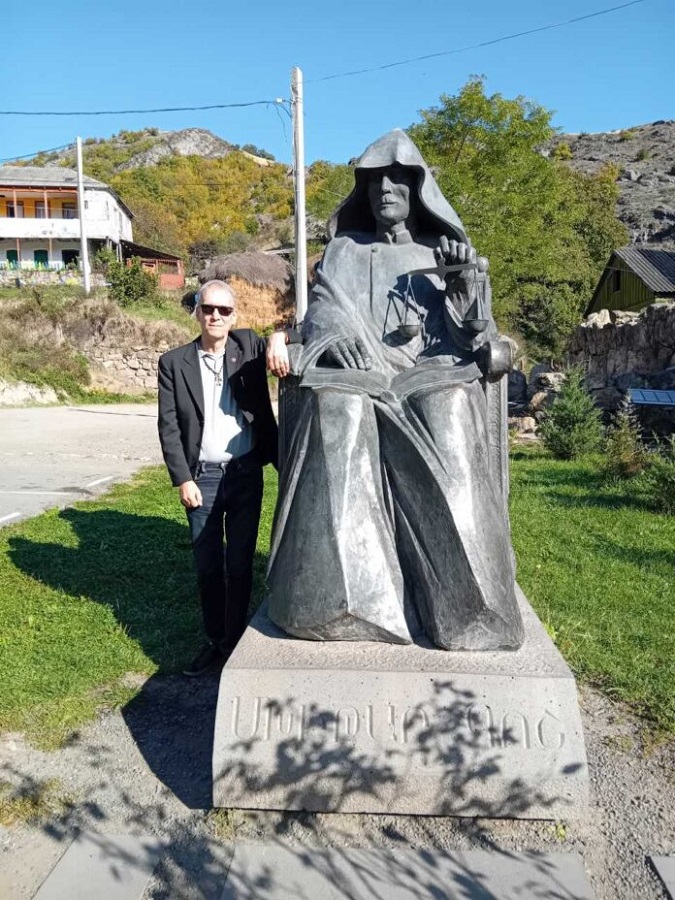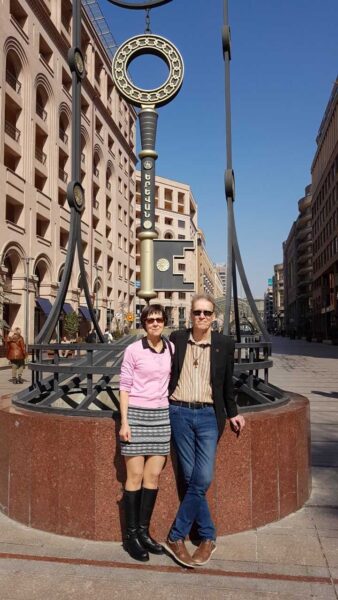YEREVAN-LUND, Sweden — Swedish historian and writer Svante Lundgren holds a doctorate in Jewish Studies from Åbo Akademi University, Finland. He has worked as a secondary school teacher and as a researcher and lecturer at Åbo Akademi University. He has for many years now worked as a teacher and researcher at the Center for Theology and Religious Studies at Lund University. His research primarily focuses on the non-Muslim minorities of the Middle East, particularly Assyrians, Armenians and Yazidis. Additional research interests include the Armenian Genocide and Western missionary and humanitarian efforts among Ottoman Armenians. Svante Lundgren is author of a number of articles and books in Swedish, English and German.
Dear Svante, you are among the rare intellectuals in Northern Europe consistently raising awareness about the plight of Eastern Christians, including Armenians. French-Armenian researcher Tigrane Yegavian, in his study The Minorities of the Orient: The Forgotten Ones of History, argues that there is no future anymore for non-Muslim minorities in the Middle East. Based on your research and your studies of Jerusalem’s Armenian Quarter, what is your perspective on this issue?
I do not agree. If we look at the broader picture, at the whole region of the Middle East, the fact is that there are more Christians in absolute numbers now than before, although their share of the total population has decreased. However, in countries torn apart by war, like Iraq and Syria, the Christians have suffered tremendously, and their number has decreased dramatically. In other countries the situation is stable, like in Egypt with up to 10 million Christian Copts. Then there are specific situations, like the one for Jerusalem’s Armenian Quarter, where the survival of a particular Christian community is at stake. I admire the courage and dedication of the young people there who have taken up the fight and I hope and pray that they will prevail.
Read also
Recently, Azerbaijan has been attempting to increase its influence in Nordic countries by organizing paid trips for individuals from Sweden and Finland. How significant could such initiatives be in shaping Scandinavian politics and public opinion?
It has some significance, but it should not be exaggerated. As these paid trips are exposed there is normally a backlash with a critical debate about why people let themselves be used by autocratic regimes. We have seen during the last years both in Sweden and Finland that these Azerbaijani initiatives result in the despotic character of the Baku regime being exposed to a wider public.
You have openly criticized the Aliyev regime. Have you ever received threats for your views?
I have never received any serious threats but a lot of hate on social media from Azerbaijani bots. And after my visit to Artsakh in 2019 my employer (Lund University) received a letter of protest from an Azerbaijani organization in Sweden, something I write about in my contribution to the Armenia, mon amour (Armenia, My Love) anthology.
Let’s discuss your Armenia-related projects. A few years ago, you participated as a narrator in the acclaimed documentary “The Map of Salvation,” which highlights the work of Scandinavian female missionaries who aided Armenians during the Genocide. Could you share your experience with this project?
It was a great experience although it was also tiring. There is little glamour in shooting a film, especially if it is done with a low budget. We shot the film in nine different countries and in all of them we cooperated with local Armenian communities. So, I learned to know a lot of Armenians in different places. After the film was completed, I was present at its première in Yerevan in April 2015. I have also been present at screenings in Sweden, Denmark, Lebanon and Los Angeles. It has been great to meet the audience; often people tell me that they have an ancestor who survived the Genocide thanks to one of these women which the movie highlights.
You mentioned the English-language anthology Armenia, Mon Amour: Ten Europeans Speak, which you co-edited with Finnish monk Serafim Seppälä. This collection offers fascinating “outsider” perspectives and deep insights into Armenia and its people. What inspired this project, and how has it been received?
Serafim and I had this idea that we wanted to know what has made people become like us, i.e., non-Armenians with a love for Armenia. So, we invited people belonging to this category of Armenophiles to write about this. In the end we managed to get ten contributions from ten different European countries. Those who have read the book like it a lot. Unfortunately, it has not sold as well as we expected. This can still change.
Last year, you published a Swedish-language novel, Yerevan’s Most Beautiful Eyes. Once again, you turned to Armenian themes — this time through fiction. What does a historian bring to the world of fiction writing, and how has this new medium allowed you to explore Armenian subjects differently?
I have read a lot of feel-good novels because they are relaxing and entertaining. They often have a similar plot: a person breaks up from his/her normal life, moves somewhere else (often to Italy or Provence) where he/she finds her true self and the love of his/her life. I decided to write a book with a similar plot but this time the protagonist does not go to any Mediterranean country, but to Armenia. This is set in 2018 so the protagonist, a sacked university lecturer from Lund, ends up amid the velvet revolution. And meets an Armenian woman with beautiful eyes.
The characters are fictional but what happens around them (the revolution) follows real events. The novel is written for people with little knowledge about Armenia. After having read it, they will know much more about Armenia — and hopefully be curious about it.
Do you have new Armenia-related projects?
I hope so, too. And I have always Armenia-related projects. In 2024 I took two tourist groups to Armenia, and I intend to go with one more this year. These one-week trips are highly appreciated and many of the participants end up as real friends of Armenia.























































